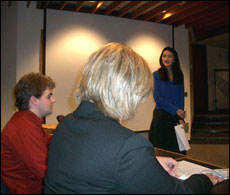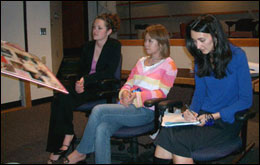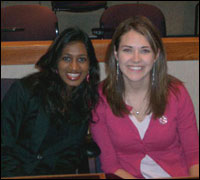Topics Course Allows Students to Understand Brands, Self

Columbia, Mo. (May 2, 2005) — “A brand is a promise that stays consistent over time,” Beth Ronsick, BJ ’89, told her students the first day of a recent three-week topics course.
“Brands are one of the most powerful assets a company can have; a customer’s perception of value may be intangible, but when properly steered, it can create tangible results that affect everything from the stock price to the company’s ability to recruit top-notch employees,” said Ronsick.
The Brand You course, however, allowed students to understand branding through an unusual twist: For each assignment, students worked on themselves as if they were brands.
Ronsick theorized, “If we look at the definition of a brand as an entity that has a consistent promise, as well as a resonant relationship with a particular group, then people are able to be brands as well. Oprah, Michael Jordan, Martha Stewart, Gandhi; all of them can be analyzed using the same consulting tools and processes that advertising agencies apply when building commercial brands.”
Much of the class focused on case studies from Ronsick’s experience as a copywriter and in-house trainer at Ogilvy & Mather in New York and Hong Kong. The examples provided a frame of reference in which to discuss the essence of a brand and the importance of brand consistency. Students were given the task of developing their own brand print, a prosaic written summary of their value and promise-for their final presentations.

The instruction also included coaching on goal setting, résumé writing, networking and various time management and organizational techniques such as mind-mapping and a personal values’ assessment.The projects allowed for students to be introspective about themselves and how they wanted to define themselves as brands. Part of the process involved sending out surveys to friends, family and acquaintances to determine how they appeared to others. This allowed them to analyze their respective strengths, weaknesses, opportunities and threats.
“I wanted to give students the tools, confidence and a fresh way to think of branding in relation to their budding careers,” Ronsick said. “The resulting mindset broadens the scope of the job search by helping students see a bigger picture: Their experience over time is not just a job here, a job there, but instead can be seen as a portfolio of total experience that needs careful, consistent and insightful managing.”
Ronsick added, “The best communications experts serve their clients in the same way: Rather than look at individual projects as one-offs, they create a cohesive, long-range brand strategy against which each individual action and message is held accountable.”

Students’ final projects were as diverse as the students themselves. Brand journals ranged from computer generated booklets to hand-made scrapbooks. The presentations included multi-media extravaganzas and intimate small group discussions. All presentations were very personal to and reflected the brand image of the presenters.
“We offer many one-hour courses, all taught by top professionals, many of whom are alumni,” said Margaret Duffy, Advertising Department Chair. “We think these courses offer students the opportunity to learn the most current trends in advertising, taught by the best in the business. In addition, students get to meet these pros one-on-one to get career advice and counseling.”
Ronsick is currently starting her own life-coaching enterprise and hopes to open a center for human potential.
Updated: April 28, 2020